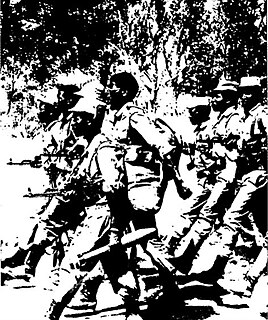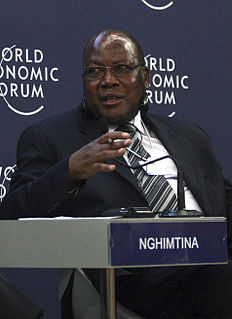Related Research Articles

The South West Africa People’s Organisation, officially known as the SWAPO Party of Namibia, is a political party and former independence movement in Namibia. Founded in 1960, it has been the governing party in Namibia since the country achieved independence in 1990. The party continues to be dominated in number and influence by the Ovambo ethnic group.

Samuel Shafiishuna Daniel Nujoma, is a Namibian revolutionary, anti-apartheid activist and politician who served three terms as the first President of Namibia, from 1990 to 2005. Nujoma was a founding member and the first president of the South West Africa People's Organization (SWAPO) in 1960. Prior to 1960, SWAPO was known as the Ovambo People's Organisation (OPO). He played an important role as leader of the national liberation movement in campaigning for Namibia's political independence from South African rule. He established the People's Liberation Army of Namibia (PLAN) in 1962 and launched a guerrilla war against the apartheid government of South Africa in August 1966 at Omungulugwombashe, beginning after the United Nations withdrew the mandate for South Africa to govern the territory. Nujoma led SWAPO during the lengthy Namibian War of Independence, which lasted from 1966 to 1989.
Herman Andimba Toivo ya Toivo was a Namibian anti-apartheid activist, politician and political prisoner. Ya Toivo was active in the pre-independence movement, and is one of the co-founders of the South West African People's Organisation (SWAPO) in 1960, and before that, its predecessor the Ovamboland People's Organization (OPO) in 1959.

The United Nations Transition Assistance Group (UNTAG) was a United Nations (UN) peacekeeping force deployed from April 1989 to March 1990 in Namibia to monitor the peace process and elections there. Namibia had been occupied by South Africa since 1915, first under a League of Nations mandate and later illegally. Since 1966, South African forces had been combating an insurgency by the People's Liberation Army of Namibia (PLAN), the military wing of the Namibian-nationalist South West African People's Organization (SWAPO). The UN Security Council passed Resolution 435 in 1978, which set out a plan for elections administered by South Africa but under UN supervision and control after a ceasefire. However, only in 1988 were the two parties able to agree to a ceasefire. As UNTAG began to deploy peacekeepers, military observers, police, and political workers, hostilities were briefly renewed on the day the transition process was supposed to begin. After a new round of negotiations, a second date was set and the elections process began in earnest. Elections for the constitutional assembly took place in November 1989. They were peaceful and declared free and fair; SWAPO won a majority of the seats. The new constitution was adopted four months later and it was followed by Namibia's official independence and the successful conclusion of UNTAG.
The Ovamboland People's Organization (OPO) was a nationalist organization that existed between 1959 and 1960 in South West Africa. The aim of the organization was to end the South African colonial administration, and the placement of South West Africa under the United Nations Trusteeship system. Andimba Toivo ya Toivo had founded its predecessor, the Ovamboland People's Congress, in 1957 in Cape Town, South Africa. In 1959, Sam Nujoma and Jacob Kuhangua established the Ovamboland People's Organization (OPO) at the Old Location in Windhoek. Sam Nujoma was the president of OPO until its transformation into the South West Africa People's Organization (SWAPO) a year later and remained president until Namibia gained independence in 1990.
The Agreement among the People's Republic of Angola, the Republic of Cuba, and the Republic of South Africa granted independence to Namibia from South Africa and ended the direct involvement of foreign troops in the Angolan Civil War. The accords were signed on 22 December 1988 at the United Nations Headquarters in New York City by the Foreign Ministers of People's Republic of Angola, Republic of Cuba and Republic of South Africa.

Utoni Daniel Nujoma is a Namibian politician who serves as Minister of Labour, Industrial Relations and Employment Creation since March 2020. He has served in various government ministerial positions in the government since 2010.

General elections were held in Namibia on 27–28 November 2009. They were the fourth general elections since independence and the fifth democratic elections. Voting ended on 28 November and official election results, released on 4 December, showed that Hifikepunye Pohamba and his SWAPO Party were re-elected, each with over 75% of the vote. Prior to the election, the South West Africa People's Organization (SWAPO) was widely expected to score a landslide victory, with the Rally for Democracy and Progress (RDP) considered SWAPO's biggest challenger. Fourteen political parties competed for seats in the National Assembly of Namibia, and twelve candidates ran for the Presidency.

The People's Liberation Army of Namibia (PLAN) was the military wing of the South West Africa People's Organisation (SWAPO). It fought against the South African Defence Force (SADF) and South West African Territorial Force (SWATF) during the South African Border War. Throughout its history, PLAN had both irregular insurgent and semi-conventional units, as well as an extensive recruitment network in rural South West Africa (Namibia). During the war most of its domestic activities consisted of mine warfare and acts of sabotage. PLAN initially lacked any standing units, and the bulk of operations were carried out by political exiles who spent cyclical periods residing in refugee camps in neighbouring states before launching raids inside South West Africa itself. By the end of the war, PLAN had 32,000 militants under arms, including three battalions of semi-conventional troops equipped with heavy weapons.

Erkki Nghimtina is a Namibian politician and former military officer in the Namibia Defence Force (NDF). A member of the South West Africa People's Organization (SWAPO), Nghimtina served as member of the National Assembly of Namibia from 1995 to 2020. He served in various cabinet roles from 2005 to 2020.
Jhonny Haikella Hakaye is a Namibian politician. A member of the South West Africa People's Organization (SWAPO), Hakaye was first elected to the National Council in 1993. He is the Chief Whip for SWAPO in the National Council.
Jeremia Nambinga" is a Namibian Politician.
Anton von Wietersheim is a Namibian politician. Wietersheim was a member of the Constituent Assembly of Namibia from 1989 to 1990 and was elected to the National Assembly as a SWAPO candidate in 1990. He served as Minister of Agriculture before resigning in 1993.
John Ya-Otto was a Namibian teacher, trade unionist, politician, author and diplomat. Born in Ovamboland, a "native reserve" in what was then called South West Africa ruled by South Africa under a League of Nations Mandate, he was smuggled as a baby by his aunt to Keetmanshoop in Southern Namibia and claimed to have been born there. This enabled him to be educated and to work permanently in the Police Zone where blacks from the "reserves" were otherwise only allowed as migrant labourers with temporary residence permits. He was educated at a Rhenish Mission School in Tsumeb and the Augustineum Training CollegeAugustineum Secondary School in Okahandja, where he obtained a teaching certificate. He then taught at the Herero School in Windhoek’s Old Location. Ya-Otto began a career in politics following the 1959 Old Location Massacre in Windhoek's Old Location black township. He joined the newly established liberation movement SWAPO and soon became part of the movement's "internal" leadership as Acting Secretary General and editor of SWAPO's newsletter Unity Wings while many of SWAPO's leaders, including its president Sam Nujoma, were already in exile. He was arrested in 1966 following the Battle of Ongulumbashe, which was the first military engagement between SWAPO and South African military and police in northern Namibia. Together with 36 others, he was accused under the sweeping definitions of "terrorism" of the newly promulgated South African "Terrorism Act". As one of the few accused who were fluent in English and Afrikaans, he was instrumental in preparing the defence together with their lawyer, Joel Carlson. Most of the accused received lifelong or 20-year prison sentences, to be served in Robben Island. However, no direct involvement of Ya-Otto in the military liberation struggle could be proven, and he received a suspended 5-year sentence under the Suppression of Communism Act and was released. He continued to organise for SWAPO, but was repeatedly arrested. Eventually, Ya-Otto fled into exile and worked as SWAPO's Secretary for Labor, and leader of the exiled National Union of Namibian Workers (NUNW), based in Lusaka until 1979 and then in Luanda. He established relationships with trade unionists around the world. In 1976, he chaired the Ya Otto Commission to investigate internal dissent in SWAPO. In 1981, he published his only book Battlefront Namibia, based on extensive interviews by Ole Gjerstad and detailing SWAPO's and his own struggle for independence. In preparation for the UN-supervised elections for independence, he returned to Namibia in June 1989 and was elected on the SWAPO list to the Constituent Assembly of Namibia which wrote the Constitution for independent Namibia and, after the attainment of independence on 21 March 1990, continued to sit as National Assembly of Namibia. Later, he was assigned the position of Ambassador to Angola. He died in Luanda on 25 May 1994. In 2010, Ya-Otto was posthumously awarded Namibia's "Most Excellent Order of the Eagle 2nd Class".
Ponhele Andrew Mbidi ya France was a Namibian politician and trade unionist. A longtime member of SWAPO, ya France was a elected into the National Assembly of Namibia from 2000-2005. He was head of the Namibian Broadcasting Corporation from 2005-2008.
Angura Peter Tshirumbu Tsheehama (1941–2010) was a commander in the People's Liberation Army of Namibia, diplomat, Chief of Intelligence, and Namibian minister.

NamRights, formerly National Society for Human Rights (NSHR), is a Namibian non-profit human rights organization, led by Phil ya Nangoloh who founded the institution in 1989.
Eliaser Tuhadeleni also known as Kaxumba Kandola was a Namibian anti-apartheid activist, guerrilla fighter and political prisoner. He was one of the co-founders of the Ovamboland People's Congress in Cape Town, South Africa in 1957 and became one of the first participants of the Namibian liberation struggle. Kaxumba Kandola took part in the battle of Omugulugwombashe which was the first battle of the Namibian War of Independence on 26 August 1966. He evaded arrest but was eventually caught and sent to Pretoria Central Prison where he was charged under the Terrorism Act of 1967. He was tried with other Namibians in the Pretoria Terrorism Trial from September 1967 to February 1968. He was sentenced to life imprisonment on Robben Island but was eventually released in 1985.
Peter Eneas Nanyemba,, (1935–1983) was a commander of the People's Liberation Army of Namibia (PLAN) during the Namibian War of Independence. Nanyemba worked as a diplomat, representing SWAPO in Botswana and Tanzania, before he was elected as the party Secretary of Defence in 1970. He played an important role as the chief organizer of PLAN during the beginning stages of the war of independence. Nanyemba is considered a national hero in Namibia.
Henock Sheya ya Kasita was a Namibian politician who served as Deputy Minister of Lands and Resettlement from 2008 to 2010. He previously was Deputy Minister of Mines and Energy from 2003 to 2008, SWAPO Chief Whip in the National Council from 1994 to 2003. Ya Kasita was a Member of the National Council for Oshana Region starting 1993 to the year 2010, and a founding Councilor for Okaku Constituency in 1993 until 2010. He also served as Deputy Chairperson for the Inter-Parliamentary Union (IPU) National Group from 1996 to 2000, and became its Chairperson from 2000 to 2004.
References
- 1 2 3 "Who's Who Namibia, Ya Nangoloh, Phil". Namibia Institute for Democracy (NID). Archived from the original on 7 November 2011. Retrieved 9 September 2011.